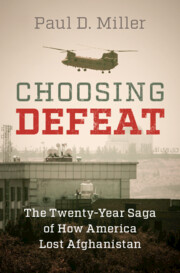
-
Select format
-
- Publisher:
- Cambridge University Press
- Publication date:
- 07 October 2025
- 07 October 2025
- ISBN:
- 9781009614382
- 9781009614375
- Dimensions:
- (229 x 152 mm)
- Weight & Pages:
- 0.91kg, 545 Pages
- Dimensions:
- Weight & Pages:
You may already have access via personal or institutional login
Book description
A truly unique all-embracing narrative of the American war in Afghanistan from the own words of its architects. Choosing Defeat takes an unparalleled inside look at America's longest war, pulling back the curtain on the inner deliberations behind the scenes. The author combines his own extensive experience in the Army, the CIA, and the White House, with interviews from policymakers within the Bush, Obama, and Trump administrations, to produce a groundbreaking study of how American leaders make wartime decisions. Transporting you inside the White House Situation Room, every key strategic debate over twenty years – from the immediate aftermath of 9/11, to Obama's surge and withdrawal, to Trump's negotiations with the Taliban, and Biden's final pullout is carefully reconstructed. Paul D. Miller identifies issues in US leadership, governance, military strategy, and policymaking that extend beyond the war in Afghanistan and highlight the existence of deeper problems in American foreign policy.
Reviews
‘This is a remarkable and important book - erudite and detailed, yet pithy and provocative. As a soldier, intelligence analyst, policymaker, professor, and scholar, Paul D. Miller has certainly earned his right to write this book and offer his take on the history of America’s Afghanistan experience. More, he has helped us understand what went so badly wrong there, even though Americans like him who served can take some solace that the war helped prevent another 9/11 despite its ultimate failure to achieve larger objectives.’
Michael O'Hanlon - Phil Knight Chair in Defense and Strategy, the Brookings Institution, and author of To Dare Mighty Things: U.S. Defense Strategy Since the Revolution
‘Paul D. Miller’s detailed accounting of how the US lost the war in Afghanistan is an important, sobering analysis that every new policymaker should read.’
Kori Schake - Director for Foreign and Defense Policy, American Enterprise Institute
‘Paul D. Miller argues that the problem in Afghanistan was not too much reliance on counterinsurgency and nation-building, but too little - and flawed, inconsistent, rushed implementation where they were undertaken at all. His perceptive, penetrating analysis is essential reading for anyone interested not just in Afghanistan but in civil warfare and stabilization generally.’
Stephen Biddle - Professor of International and Public Affairs, Columbia University
Contents
Metrics
Altmetric attention score
Full text views
Full text views help Loading metrics...
Loading metrics...
* Views captured on Cambridge Core between #date#. This data will be updated every 24 hours.
Usage data cannot currently be displayed.
Accessibility standard: Unknown
Why this information is here
This section outlines the accessibility features of this content - including support for screen readers, full keyboard navigation and high-contrast display options. This may not be relevant for you.
Accessibility Information
Accessibility compliance for the PDF of this book is currently unknown and may be updated in the future.

